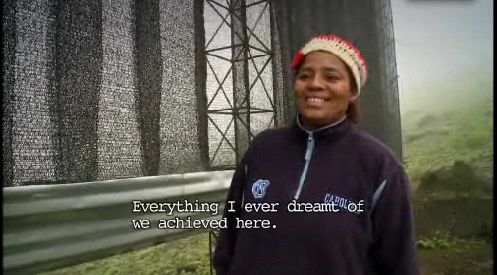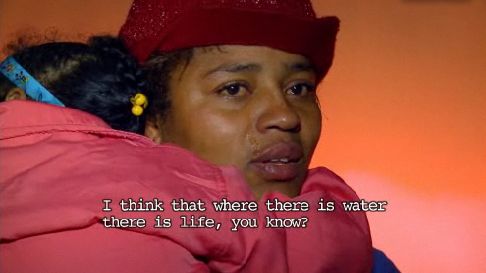I’ve spent some time this week trying to find another video online that I watched over the weekend. Alas, none that I can embed. That said, at least I found it!
It was episode 4 of the series, Hot Cities, ‘Meltdown!’ and focuses on water security, which in many areas of the world is already under threat (including my home state). The most touching personal story is that of Magali De La Cruz, who lives in a shanty town fringing the city of Lima with no permanent water supply to her house.

It’s a case of adaptation and innovation expressed at it’s finest (for $1500, they have built a fog catcher that provides them with 200L per day), yet the episode builds a strong case as to how insecure our water supply is becoming as climate continues to change. This is an excellent example of the anthropogenic pressures on a physical process threaten a system that ultimately supports our species.
They move on from Peru, to the Murray River – causing a deep pang to many South Aussies, including myself (I’ll discuss the Murray in chapter five in The Human Island). I disagree with some of what is being discussed on the Murray, however.

- The Murray at Renmark mid November 2010
Firstly, the family talking about the old days of watering the garden; the ‘good old days’ were nothing but wasteful times, where we took the arid environment for granted – we, along eastern and southern Australia, have long overexploited the Murray Darling Basin [MDB]. Secondly, I made the point recently that building a desalination plant in SA is simply an expensive state initiative to bandage a national problem. We all, who rely on the MDB – the environment included – require more water in system. The system should be fed at the head, on the eastern coastline, as much as possible by renewable sources. Thirdly, buckets in a shower are a futile effort and a tripping hazard – residential use is relatively small when compared to industrial and irrigation use of the Murray. Mike puts it well in the episode:
“I find it regrettable that Adelaide has had to go to a desalination plant. I would’ve loved to have seen the city invest in much more recycling of water and in capture of storm water and dropping it into storage…
“Adelaide ended up with a desalination plant because we didn’t plan early enough.”
Lucky for us, the drought broke, which has given us a small window of opportunity. However, I suspect the road ahead will be more difficult and will require radical changes to how we relate the to MDB.
Click here to watch Meltdown! episode 4 of Hot cities.


I realise this is fairly off-topic, but it’s a great little set of videos on urban food growing. Probably fits into some of your stuff – you’ll know where you like it better than I might.
http://climatecrocks.com/2010/11/27/building-a-sustainable-society-urban-aquaculture/#more-953
LikeLike
Cheers Adelady – I’ll certainly have a look at it. For the Human Island project, it probably won’t fit (it would be great for ‘the solutions’, where I going to have that). I’d like to have something else that stands on it’s own as my outlook, if we actually acted on climate change and resource security. I’m sort of in a transitional place at the moment from an optimistic ‘TOD-POD / let’s redevelop the world’ state to ‘let’s make lemonade from lemons’ one and once I’ve worked out what that means, I might have something to work with! lol
Hope all’s well in your world 🙂
LikeLike
Not too bad.
Funny that I spotted this today. Tonight I watched David Attenborough’s ‘Death of the Oceans?’ Makes the idea of growing fish away from natural habitats an even better idea. Especially if we that keeps fish farms away from natural streams and coasts. (I’ve always had a bit of a hankering for a dam to grow yabbies. Luv ’em.)
LikeLike
I watched it too. I knew about it as Ove from Climateshifts had reported that it covered some of his work. My partner was thoroughly depressed after we watched that. Needless to say that I’ve been harping on that I won’t eat fish and have at times discussed some of the issues of the oceans on this blog – all of which slipped her by.
Basically, fishing is one of the most primitive industries we still use. Sure, the technology is wonderful – so much so that we’re stripping the oceans bare, but fishing itself isn’t farming, it’s not aquaculture. It’s natural harvest. We don’t have any input, we just take. No more than the hunter-gatherers of our deep past.
LikeLike
You don’t have to give up fish entirely. One of the sustainable food orgs has come up with a list of the small, low-in-the-food-chain species we can take. Yaaaay, that includes whiting. As well as sardines and other littlies.
But no shark or tuna or any of those big dinner party platter fish. None at all.
LikeLike
I know you don’t have to. I’ve also given up beef entirely because of the inefficiency in meat production (which isn’t so bad when the animal feeds on grass and ag waste).
Mercury is another reason not to eat large long lived fish. I must say, SA whiting and flathead were my favourite, which I do miss…
LikeLike